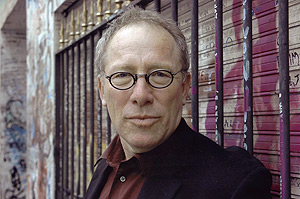Berkeleyan
Historian Thomas Laqueur receives Mellon Foundation award for distinguished achievement
'Depth and liveliness' characterize the noted scholar's enquiries into religion, death, and sex
![]()
| 16 January 2008
Professor of History Thomas Laqueur has been selected as a Mellon Foundation Distinguished Achievement Award recipient for his erudite study of such unconventional topics as the history of sexuality, death and dying, and the body and gender, the foundation announced on Jan. 2.
 Thomas Laqueur (UC Berkeley photo) |
Laqueur and the Berkeley campus will receive up to $1.5 million from the Andrew W. Mellon Foundation in recognition of the professor's influential scholarship involving challenging topics largely ignored in the historical literature.
"Laqueur's contributions have stimulated important debates where none existed before, and the reach and influence of his work is global, as evidenced by the large number of languages into which his books have been translated," foundation officials said in a statement announcing the award.
His research interests include various topics in the history of sexuality and medicine as well as more general issues involving cultural history. Among his books are Making Sex: Body and Gender From the Greeks to Freud (Harvard University Press, 1990), which has been translated into more than a dozen languages; Solitary Sex: A Cultural History of Masturbation (Zone Books, 2003), translated into nine languages; and Religion and Respectability: Sunday Schools and Working Class Culture, 1780-1850 (Yale University Press, 1976).
Laqueur's dozens of articles have been on topics including the history of death and commemoration; the history of religion and of literacy; the politics of reproductive biology; and the origins of human rights. He writes regularly for The London Review of Books, The Threepenny Review (a leading literary journal), and the online magazine Slate, among other publications.
"Mellon's award is recognition not just of my 'achievements' but of the teaching and scholarship of colleagues in my wonderful department and in the human sciences at Berkeley generally," Laqueur said. "I have thrived in this great university, which honors openness and innovation. I hope to use [the funding] to support collaborative research and teaching as well as creative arts projects on questions that have engaged me all of my life: the relationship between humans and animals, the connections between sexuality and religion, the comparative history of reading east and west, and the overwhelming place of death in culture."
Laqueur was one of three scholars to be given the foundation's 2007 Distinguished Achievement Award. (The other winners are professors Peter Brooks of Yale University and William Harris of Columbia University.) Though the grants benefit individual recipients, the funds are to support institutional research and teaching activities.
Laqueur, who joined the Berkeley history faculty in 1973, served as director of the campus's Townsend Center for the Humanities from 1992-95 and as the center's acting director during the 2003-04 school year. He is a founding member and co-chair of the editorial board of Representations, a University of California Press interdisciplinary journal. The Mellon Foundation, which seeks to promote the importance of the humanities in the nation's intellectual life, noted the "energy and liveliness" that Laqueur brings to his professional activities as well as to his scholarship and writing. As a teacher, it said, he is known for fostering innovation and daring among his students.
Mary Elizabeth Berry, chair of Berkeley's history department, said of Laqueur: "Tom knows nothing about 'compartmentalization.' His restless research, and the cello music he practices every day, and his loving debates with his friends and his quite astonishingly personal exploration of novels (and most written words), and his dauntless walks and joyous parties - all these things spill into his teaching, as his teaching spills into everything else. This kind of engagement is what we treasure in Tom, and want in ourselves, and try to realize daily in the totally real world of classrooms and offices."

